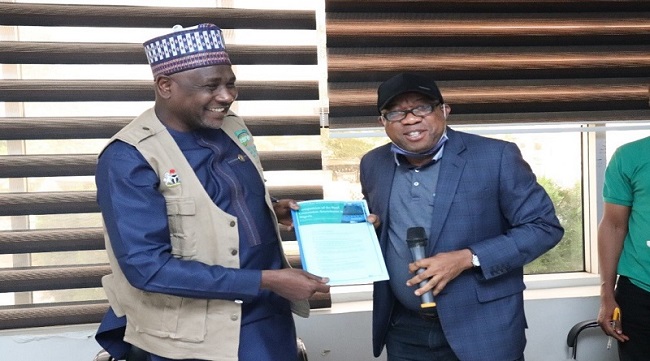The Sustainable Research and Action for Environmental Development (SRADev Nigeria), Lagos-based a non-government organisation, has stressed the need to collaborate with government to move forward the process of domesticating and transposing the Basel Convention amendment in Nigeria.

Executive Director, SRADev Nigeria, Dr. Leslie Adogame, stated this penultimate week when the organisation paid a courtesy visit to the Director, Department of Pollution Control and Human Health, Federal Ministry of Environment, Mr. Charles Ikea, and the Director General, National Environmental Standard Regulation and Enforcement Agency (NESREA), Prof. Aliyu Jaro, in Abuja.
Adogame disclosed that the organisation is executing a mini project funded by Global Alliance against Incinerator (GAIA) to transpose the Basel Convention amendment and highlighted the expert review conducted by Prof Babajide Alo and Prof. Percy Onianwa on the National Plastic Waste Policy in relation to the Basel Convention and identified some gaps.
As a result of this, he said his organisation produced a policy brief document which discussed the identified gaps and made some recommendations on how the country can work around the gaps that inadvertently amounts to the domestication of the Basel Convention amendment.
He listed part of the recommendations to include the need for massive awareness creation, the need for Nigeria to ratify the Bamako Convention which would support to a very large extent the provisions of the Basel Convention on hazardous waste management, non-mention of plastics waste trade and transboundary movement of plastics waste in the policy document, and non-provision of contamination limit to guide the involvement of Standards Organisation of Nigeria (SON) in the plastic waste management, among others.
The SRADev boss urged the ministry to take advantage of the opportunity of the timeliness of the policy brief and the project to immediately review the National Policy on Plastics Waste Management to infuse the Basel Convention amendments.
He also underscored the need to create contamination limits on plastics which is the responsibility of SON, to provide control on transboundary movement of plastic waste to be the responsibility of Nigerian Custom Service and for training of key stakeholders to ensure the successful management of plastic waste.
He hinted that the organisation would hold a stakeholders advocacy workshop in January 2022 aimed at kick-starting the awareness for domestication and transposing of the Basel Convention amendment. He later presented a copy of the policy brief to both the Director of Pollution Control and the Director General of NESREA.
Deputy Director, Hazardous Waste Unit, Ministry of Environment, Oyewole Ashaolu, an engineer, who received the SRADev delegation on behalf of the Director, commended SRADev for its painstaking efforts on the Basel Convention and waste management in Nigeria.
He stated that the reason for categorising plastics as hazardous waste is hinged on the usage of heavy metals in its production. On the issue of transboundary movement of plastics waste, he said the country presently does not allow importation of plastics; as, being an oil rich country, has the capacity to produce the amount needed.
He disclosed that Nigeria is exporting plastics to other countries where they would look into how to control the waste from it. He also stressed that the country is very careful on plastic importation that the only time plastic is imported is for research purpose which is controlled. He concluded that the ministry would look at the policy brief and take actions to transpose the Basel Convention amendment.
Assistant Director and Desk Officer for Hazardous Waste Control, Dr. L. Nwakwo, also commended the effort of the team on the review of the plastic waste policy, said that they would immediately take a look at the brief in line with the plastics waste policy to recommend to the minister the need for the review of the policy where necessary.
He added that, at the African Global Regional meeting, there was conclusion by some African states including Nigeria not to allow plastics waste from other countries because there is no instrument to ascertain contamination limit in Africa. He mentioned also that the same stand was given to the EU bloc on plastic waste movement.
On the issue of Bamako Convention, Nwankwo said it is the responsibility of the department, but nothing has been done so far because it has not been ratified by Nigeria. He added that the department recently recommended its stand to the request gotten from the president of Mali on the ratification of the Bamako convention.
He believes that the Bamako Convention is dragging because some schools of thought are of the opinion that it is rigid as it advocates outright ban on plastics unlike the Basel Convention which is flexible to accommodate plastics waste management. He concluded that to justify the need to ratify the Bamako Convention, plastics waste amendment will be instrumental, hence they will recommend the need to immediately commence work on the ratification of the Convention to the minister.
Director General of NESREA, Prof. Aliyu Jaro, on his part appreciated the team and the review of the policy document. He said NESREA would review the regulation in the coming year to include the plastics waste amendment which the policy brief will be helpful in the review.
Jaro also welcomed the idea of the workshop and that they are willing to support the success of the project to ensure the awareness for the plastic waste amendment is strengthened. The courtesy visit was attended by officials of the Ministry of Environment and NESREA.
